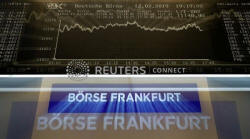Central banks' dovish cooing keeps world stocks lulled near two-week
highs
 Send a link to a friend
Send a link to a friend
 [June 19, 2019] By
Sujata Rao [June 19, 2019] By
Sujata Rao
LONDON (Reuters) - World stocks held near
two-week highs on Wednesday as investors bet on a worldwide wave of
central bank stimulus, with expectations building that the United States
and the euro zone may deliver interest rate cuts as early as July.
Markets have been fired up by European Central Bank President Mario
Draghi's Tuesday volte-face on policy easing. In one of the biggest
policy reversals of his eight-year tenure, Draghi flagged more easing if
inflation failed to pick up.
But some caution seeped in after the previous day's frenzy.
German and U.S. bond yields, which hit record lows and two-year lows
respectively after Draghi's comments, inched higher to trade just off
those levels.
European shares slipped off six-week highs and Wall Street futures
indicated a slightly weaker opening on Wednesday.
Some of the trepidation is down to the U.S. Federal Reserve's meeting,
the decision of which is due at 1800 GMT. It is widely expected to
follow the lead of the European Central Bank and open the door to future
rate cuts.
"It should be really clear to absolutely everyone that this is a
monetary policy turning point ... Those rate cut expectations have now
shifted much closer," said Ulrich Leuchtmann, head of currency and
emerging markets research at Commerzbank.

"Of course the other question is: What is the Fed doing? If the Fed
takes the fundamental risk of political pressure seriously, they cannot
do anything today," he said, noting that President Donald Trump's
strident calls for lower interest rates posed a dilemma for the Fed.
But market sentiment has been buoyed also by news that Trump will meet
Chinese leader Xi Jinping at the G20 summit this month, even though many
doubt the two men can reach a breakthrough on ending their trade
dispute.
MSCI's global equity index rose 0.4%, adding to Tuesday's 1% gain, as
Asian shares excluding Japan followed the lead of their European and
U.S. counterparts to jump almost 2% -- their biggest one-day rally since
January.
Tokyo and Shanghai too climbed almost 2% while Australia's main bourse
hit an 11-year high. New York's S&P500 jumped almost 1% on Tuesday to
approach recent record highs.
(Graphic: S&P500 approaches record high - https://tmsnrt.rs/2Y7dDQE)
All eyes are now on the Fed, with Chairman Jerome Powell holding a news
conference after the announcement.
Futures are almost fully priced for a quarter-point easing in July and
imply more than 60 basis points of cuts by Christmas.
As for Europe, markets have almost fully priced a cut in September,
though some analysts, such as those at Germany's Commerzbank, now say
rates will be cut in July, rather than in the last quarter of the year
as they had predicted earlier.
ECB sources told Reuters Draghi had flagged his measures so strongly
that other board members would be unable to disagree with him at their
July 25 meeting.
[to top of second column] |

The German share prize index (DAX) board is seen at the end of a
trading day at the German stock exchange (Deutsche Boerse) in
Frankfurt, Germany, February 12, 2019. REUTERS/Kai Pfaffenbach/File
Photo

Yet all the clamor for easing creates risks that policymakers will disappoint.
"Market expectations for a dovish shift are nearly universal, the only question
seems to be the degree," said Blake Gwinn, head of front-end rates at NatWest
Markets, referring to the Fed.
"Markets will be looking for validation of this pricing," he added. "We think
this represents a fairly high bar for the Fed to deliver a dovish surprise."
SUB-ZERO YIELDS
BofA Merrill Lynch's latest fund manager survey spoke volumes about the sea
change in sentiment. It showed investors were dumping stocks and had upped bond
allocations to nearly eight-year highs. They also had crowded into safe-haven
U.S. Treasury bonds and cash.
The prospect of more policy easing and worries for the growth outlook have sent
global bond yields tumbling this year.
German yields were close to the minus 0.33% record low hit on Tuesday, while
Japanese yields sank to the lowest since August 2016 at -0.145%.
(Graphic: Multiverse bond index - https://tmsnrt.rs/2Y0uHbg)
Yields on the U.S. 10-year note reached their lowest since September 2017 at
2.016%, a world away from the 3.25% top touched in November last year. The yield
rose slightly from those lows but is down some 60 bps since January.
(Graphic: German, US bond yields in sharp falls this year - https://tmsnrt.rs/2Y7buo4)
The fallout in currencies has been significantly less, mostly because it is hard
for one to gain when all the major central banks are under pressure to ease.
The euro did pull back after Draghi's comments, but at $1.118 it touched only a
two-week low.
The dollar eased slightly on the yen to 108.3, but was flat versus a basket of
currencies. The yuan touched three-week highs versus the dollar on the trade
news.

In commodities, the rate-cut buzz kept gold just off 14-month highs at $1,345.16
per ounce. Brent crude futures however slipped 0.6% to $61.75 a barrel,
pressured by economic growth worries.
(Reporting by Sujata Rao; Additional reporting by Karin Strohecker in London and
Wayne Cole in Sydney; Editing by Hugh Lawson)
[© 2019 Thomson Reuters. All rights
reserved.] Copyright 2019 Reuters. All rights reserved. This material may not be published,
broadcast, rewritten or redistributed.
Thompson Reuters is solely responsible for this content. |